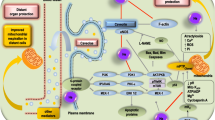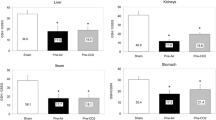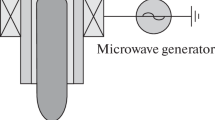Abstract
Introduction
The aim of the present study was to investigate the gas-dependent effects of pneumoperitoneum on wound healing distant from the abdomen.
Materials and methods
Dorsal skin incisions were performed in 54 male Sprague–Dawley rats. A CO2 or a helium pneumoperitoneum of 3 mmHg was maintained before, with an overall duration of 30 min (each n = 18). Rats in the control group received laparotomy only (n = 18). Animals were killed after 5 and 10 days. The infiltration of macrophages (CD 68), expression of matrix metalloproteinase 13 (MMP-13) and collagen I/III ratios were analysed in the dorsal skin wounds.
Results
Both after 5 and 10 days, infiltration of macrophages and expression of MMP-13 were greatest after helium pneumoperitoneum. After 5 days, collagen I/III ratio was significantly increased in the helium group. After 10 days, collagen I/III ratio was lowest in the CO2 group.
Conclusion
Our results suggest beneficial effects on systemic wound healing for helium pneumoperitoneum as compared to CO2.




Similar content being viewed by others
References
Polat C, Arikan Y, Vatansev C, Akbulut G, Yilmaz S, Dilek FH, Gokce O (2002) The effects of increased intraabdominal pressure on colonic anastomoses. Surg Endosc 16:1314–1319
Kologlu M, Sayek I, Kologlu LB, Eng C, Onat D (1999) Effect of persistently elevated intraabdominal pressure on healing of colonic anastomoses. Am J Surg 178:293–297
Murray JA, Cornwell EE 3rd, Velmahos GC, Rivkind AI, Hedman T, Abrahams JH, Katkhouda N, Berne TV, Demetriades D (2001) Healing of traumatic diaphragm injuries: comparison of laparoscopic versus open techniques in an animal model. J Surg Res 100:189–191
Rosch R, Stumpf M, Junge K, Ardic D, Ulmer F, Schumpelick V (2004) Impact of pressure and gas type on anastomotic wound healing in rats. Langenbecks Arch Surg 389:261–266
Zieren J, Zieren HU, Jacobi CA, Wenger FA, Muller JM (1998) Prospective randomized study comparing laparoscopic and open tension-free inguinal hernia repair with Shouldice’s operation. Am J Surg 175:330–333
Kockerling F, Rose J, Schneider C, Scheidbach H, Scheuerlein H, Reymond MA, Reck T, Konradt J, Bruch HP, Zornig C, Barlehner E, Kuthe A, Szinicz G, Richter HA, Hohenberger W (1999) Laparoscopic colorectal anastomosis: risk of postoperative leakage. Results of a multicenter study. Laparoscopic Colorectal Surgery Study Group (LCSSG). Surg Endosc 13:639–644
Hartley JE, Mehigan BJ, Qureshi AE, Duthie GS, Lee PW, Monson JR (2001) Total mesorectal excision: assessment of the laparoscopic approach. Dis Colon Rectum 44:315–321
Thaler K, Dinnewitzer A, Mascha E, Arrigain S, Weiss EG, Nogueras JJ, Wexner SD (2003) Long-term outcome and health-related quality of life after laparoscopic and open colectomy for benign disease. Surg Endosc 17:1404–1408
Kollmorgen CF, Thompson GB, Grant CS, van Heerden JA, Byrne J, Davies ET, Donohue JH, Ilstrup DM, Young WF (1998) Laparoscopic versus open posterior adrenalectomy: comparison of acute-phase response and wound healing in the cushingoid porcine model. World J Surg 22:613–619
Robbins SB, Pofahl WE, Gonzalez RP (2001) Laparoscopic ventral hernia repair reduces wound complications. Am Surgeon 67:896–900
Hansen JB, Smithers BM, Schache D, Wall DR, Miller BJ, Menzies BL (1996) Laparoscopic versus open appendectomy: prospective randomized trial. World J Surg 20:17–20
Willis S, Ulmer F, Fell T, Butz N, Tittel A, Schumpelick V (2005) Laparoscopic colectomy versus open colectomy for sigmoid diverticular disease in routine surgery. Viszeralchirurgie 27–32
Agalar F, Hamaloglu E, Daphan C, Tarim A, Onur R, Renda N, Sayek I (2000) Effects of CO2 insufflation and laparotomy on wound healing in mice. Aust NZ J Surg 70:739–742
Wickens JC, Whelan RL, Allendorf JD, Donahue J, Buxton E, McKee A, Panageas K, Gleason N, Lee S, Bessler M (1998) Wound tensile strength and contraction rate are not affected by laparotomy or pneumoperitoneum. Surg Endosc 12:1166–1170
Neuberger TJ, Andrus CH, Wittgen CM, Wade TP, Kaminski DL (1996) Prospective comparison of helium versus carbon dioxide pneumoperitoneum. Gastrointest Endosc 43:38–41
Rademaker BM, Bannenberg JJ, Kalkman CJ, Meyer DW (1995) Effects of pneumoperitoneum with helium on hemodynamics and oxygen transport: a comparison with carbon dioxide. J Laparoendosc Surg 5:15–20
Kuntz C, Wunsch A, Bodeker C, Bay F, Rosch R, Windeler J, Herfarth C (2000) Effect of pressure and gas type on intraabdominal, subcutaneous, and blood pH in laparoscopy. Surg Endosc 14:367–371
Fernandez-Cruz L, Saenz A, Taura P, Sabater L, Astudillo E, Fontanals J (1998) Helium and carbon dioxide pneumoperitoneum in patients with pheochromocytoma undergoing laparoscopic adrenalectomy. World J Surg 22:1250–1255
Chekan EG, Nataraj C, Clary EM, Hayward TZ, Brody FJ, Stamat JC, Fina MC, Eubanks WS, Westcott CJ (1999) Intraperitoneal immunity and pneumoperitoneum. Surg Endosc 13:1135–1138
Jacobi CA, Ordemann J, Halle E, Volk HD, Muller JM (1999) Impact of laparoscopy with carbon dioxide versus helium on local and systemic inflammation in an animal model of peritonitis. J Laparoendosc Adv Surg Tech A 9:305–312
Nagelschmidt M, Gerbecks D, Minor T (2001) The impact of gas laparoscopy on abdominal plasminogen activator activity. Surg Endosc 15:585–588
Rosch R, Junge K, Binnebösel M, Mirgarth N, Klinge U, Schumpelick V (2006) Improved abdominal wall wound healing by helium pneumoperitoneum. Surg Endosc (in press)
Junqueira LC, Cossermelli W, Brentani R (1978) Differential staining of collagens type I, II and III by Sirius Red and polarization microscopy. Arch Histol Jpn 41:267–274
Armstrong DG, Jude EB (2002) The role of matrix metalloproteinases in wound healing. J Am Podiatr Med Assoc 92:12–18
Jackson PG, Evans SR (2000) Intraperitoneal macrophages and tumor immunity: a review. J Surg Oncol 75:146–154
Gutt CN, Heinz P, Kaps W, Paolucci V (1997) The phagocytosis activity during conventional and laparoscopic operations in the rat. A preliminary study. Surg Endosc 11:899–901
Neuhaus SJ, Watson DI, Ellis T, Lafullarde T, Jamieson GG, Russell WJ (2001) Metabolic and immunologic consequences of laparoscopy with helium or carbon dioxide insufflation: a randomized clinical study. ANZ J Surg 71:447–452
Hanly EJ, Fuentes JM, Aurora AR, Bachman SL, De MA, Marohn MR, Talamini MA (2006) Carbon dioxide pneumoperitoneum prevents mortality from sepsis. Surg Endosc 20:1482–1487
Rosch R, Stumpf M, Junge K, Drinjakovic D, Schachtrupp A, Afify M, Schumpelick V (2005) Influence of pneumoperitoneum on small bowel anastomoses: a histological analysis in the rat model. J Invest Surg 18:63–69
Thomson IA, Fitch W, Hughes RL, Campbell D (1983) Effect of increased concentrations of carbon dioxide during halothane anaesthesia on liver blood flow and hepatic oxygen consumption. Br J Anaesth 55:1231–1237
Portera CA, Love EJ, Memore L, Zhang L, Muller A, Browder W, Williams DL (1997) Effect of macrophage stimulation on collagen biosynthesis in the healing wound. Am Surgeon 63:125–131
Browder W, Williams D, Lucore P, Pretus H, Jones E, McNamee R (1988) Effect of enhanced macrophage function on early wound healing. Surgery 104:224–230
Eljaafari A, Duperrier K, Mazet S, Bardin C, Bernaud J, Durand B, Gebuhrer L, Betuel H, Rigal D (1998) Generation of stable monocyte-derived dendritic cells in the presence of high concentrations of homologous or autologous serum: influence of extra-cellular pH. Hum Immunol 59:625–634
Grinstein S, Swallow CJ, Rotstein OD (1991) Regulation of cytoplasmic pH in phagocytic cell function and dysfunction. Clin Biochem 24:241–247
Wood GC, Keech MK (1960) The formation of fibrils from collagen solutions. 1. The effect of experimental conditions: kinetic and electron-microscope studies. Biochem J 75:588–598
Vanamee P, Porter KR (1951) Observations with the electron microscope on the solvation and reconstitution of collagen. J Exp Med 94:255–266
Nigra TP, Martin GR, Eagle H (1973) The effect of environmental pH on collagen synthesis by cultured cells. Biochem Biophys Res Commun 53:272–281
Bard JB, Hulmes DJ, Purdom IF, Ross AS (1993) Chick corneal development in vitro: diverse effects of pH on collagen assembly. J Cell Sci 105(Pt 4):1045–1055
Paraskeva PA, Ridgway PF, Jones T, Smith A, Peck DH, Darzi AW (2005) Laparoscopic environmental changes during surgery enhance the invasive potential of tumours. Tumour Biol 26:94–102
Vaalamo M, Mattila L, Johansson N, Kariniemi AL, Karjalainen-Lindsberg ML, Kahari VM, Saarialho-Kere U (1997) Distinct populations of stromal cells express collagenase-3 (MMP-13) and collagenase-1 (MMP-1) in chronic ulcers but not in normally healing wounds. J Invest Dermatol 109:96–101
Acknowledgement
We are grateful to Mrs. Ellen Krott for her most excellent and careful assistance during this investigation.
Author information
Authors and Affiliations
Corresponding author
Rights and permissions
About this article
Cite this article
Rosch, R., Junge, K., Binnebösel, M. et al. Gas-related impact of pneumoperitoneum on systemic wound healing. Langenbecks Arch Surg 393, 75–80 (2008). https://doi.org/10.1007/s00423-006-0136-3
Received:
Accepted:
Published:
Issue Date:
DOI: https://doi.org/10.1007/s00423-006-0136-3




